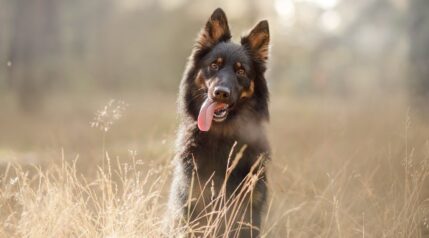The Golden Retriever, or Golden, is a popular member of the American Kennel Club’s Sporting Group, and he’s currently ranked at number three in the A.K.C.’s chart.
Similar to the Labrador, Goldens are gundogs that are bred to work in the hunting field, retrieving shot water and game birds. However, the breed also makes a great family pet. The trustworthy Golden is always eager-to-please and is also highly trainable.
These pups just never seem to grow out of their puppyhood, remaining happy, playful, and sanguine right through to their senior years. Goldens love kids, other dogs, and even the family cat! Before deciding to welcome a Golden Retriever into your household, you’ll need to find out more about the breed. So, we’ve put together this guide to answer all your questions about the noble Golden Retriever.
History

The Golden Retriever breed was created during the Victorian era. It’s thought that today’s Golden is a mixture of several breeds, including a yellow retriever, flat-coated retriever, red setter, and Tweed water spaniel.
Dogs that closely resemble Golden Retrievers can be seen in old paintings and studbooks from the era. These dogs were bred on the Guisachan Estate by Lord Tweedmouth, a Scottish landowner.
The breed was finally classified in 1911 by the English Kennel Club as “Retrievers.” The name yellow or Golden retriever was first recognized in 1920. The American Kennel Club first registered the Golden Retriever in 1932. The modern Golden Retriever is a member of the Sporting Group.
Goldens have established themselves as hunting dogs, working dogs, and much-loved companions and family pets, and work in many different fields, including:
- Search and rescue
- Therapy
- Arson detection
- Drug detection
- Assistance work for disabled people
Goldens also enjoy action sports, including agility, dock diving, and flyball. The main reason for the Golden Retriever’s enduring popularity is the breed’s wonderful temperament and personality.
Temperament

The Golden’s character is gentle, kind, and he’s always eager to please his owner. Golden Retrievers are affection seekers and are very much people-oriented. A well-bred Golden will have all these character traits. However, in recent years unregulated breeding has led to some Golden Retrievers appearing with introverted, aggressive characteristics that can be directed toward other dogs and people.
Such is the enthusiasm of the Golden Retriever that jumping up at people can be a problem. That’s a real issue if you have small kids in your household, so early obedience training and socialization are essential if you want to have a mannerly dog in your home. Goldens are highly trainable, adapting well to essential obedience work.
Some Golden Retrievers can become unruly if they’re left unattended for long periods. Barking, digging, chewing, and stealing food are all behaviors that can be exhibited by an isolated Golden who has not had enough exercise or mental stimulation.
Size & Appearance

Golden Retrievers are big dogs! Male Goldens can stand from 23 to 24 inches in height at the shoulder, weighing in at between 65 and 75 pounds. Females are slightly smaller, standing 21.5 to 22.5 inches tall and weighing 55 to 65 pounds. Learn more in our Golden Retriever growth chart article.
These large frames are sturdy, confident, and powerful. They are symmetrical in stature, displaying balance and poise. Their heads are broad with a slight lateral arch and rounded stop. Gentle, playful, kind eyes offer a sincere and genuine expression. Folded ears complete the look of this handsome pooch.
Coat & Colors

The Golden Retriever comes in various shades of rich and lustrous gold, ranging from deep red to almost white. Goldens have a thick, water-repellent double coat, and they’re very heavy shedders. You’ll need to work hard to stay on top of the fur, so invest in the right grooming products to keep hair shedding down.
These golden coats are medium in length and grow a little longer around their tail, ears, and neck. This longer hair is commonly known as feathering fur because it is slightly wavier than the rest of its fur. This feathered fur may be lighter than the rest of the coat. They are silky soft to the touch.
Exercise & Living Conditions

Golden Retrievers need plenty of exercise; ideally, two-hour-long walks per day. Goldens are water dogs, and they love swimming, so you might want to take your dog to your local beach or lake for a fun playdate.
Goldens love most dog sports, including dock diving, agility, and obedience, and that’s a great way of burning off your dog’s excess energy. Your kids will enjoy hours of fun, throwing tennis balls for your Golden Retriever to fetch. Also, you can entertain your dog by teaching him tricks.
That said, it’s important not to overdo the exercise during the first two years of your puppy’s life. Golden’s growth plates are still forming during that period, and too much exercise can damage them. So, avoid activities that involve jumping for the first couple of years of your dog’s life.
Goldens are very much people-oriented. If you want a dog that will happily live outside in your yard, a Golden Retriever is not the right choice for you.
A lonely, frustrated Golden Retriever will quickly begin barking, digging up your yard, and generally becoming destructive. In short; a Golden needs to live indoors with his human family.
Because they can be destructive, you’ll want to make sure you have plenty of Golden Retriever-approved dog toys laying around to keep them entertained when they aren’t engaged in vigorous training sessions. Also make sure you have the right bed for your pup.
Training

One of the things owners love most about their Golden is his intelligence and willingness to learn and to please. They leash train easily and do very well adapting to walking with a harness or leash. We recommend training with a Golden Retriever-sized dog harness that discourages pulling.
Capitalize on your Golden’s smart nature by introducing him to many different situations and people during his puppyhood. When your puppy is old enough and has received all his vaccinations, take him to puppy classes.
Also, you might want to check out the American Kennel Club’s S.T.A.R. Puppy Program. Goldens are also fast learners when it comes to crate training as a puppy.
Health

Although Goldens are generally healthy dogs with an average lifespan of between ten and 13 years, the breed is prone to a few genetic health conditions of which potential owners should be aware, including:
- Hemangiosarcoma
- Lymphosarcoma
- Mast cell tumors
- Bone cancer
- Hip dysplasia
- Elbow dysplasia
- Eye problems
- Subaortic stenosis
Hemangiosarcoma
Hemangiosarcoma (H.A.S.) is a form of cancer that develops in the endothelial cells that usually create blood vessels. The cause of the disease is unknown. However, sunlight can cause the condition to develop on the inner thighs, belly skin, eyelid membranes, and eyelids of pale-skinned dogs such as Golden Retrievers.
Lymphosarcoma
Lymphosarcoma is the third most common canine cancer. The condition affects the lymphoid tissue and the lymphocytes (a specific type of blood cell). Areas of the body that can be affected include the lymph nodes, liver, spleen, bone marrow, and gastrointestinal tract.
Hip Dysplasia
Hip dysplasia is an inherited condition that develops when the thigh bone head does not sit properly in the hip socket joint. Eventually, hip dysplasia leads to chronic, painful arthritis, which requires expensive surgical treatment to correct.
Elbow Dysplasia
Elbow dysplasia is another genetic condition where the elbow joint is deformed or doesn’t develop properly. The disease ultimately causes osteoarthritis.
Subaortic Stenosis
Subaortic stenosis is a condition that causes a narrowing of the aortic heart valve. The aortic valve is the valve that allows blood to leave the dog’s heart en route to the rest of the body. Aortic stenosis causes the valve to narrow, forcing the heart to work much harder than it usually does to push blood out through the valve. The condition ultimately leads to failure of the heart muscle and other associated problems.
Other Conditions
Unfortunately, Golden Retrievers are vulnerable to several other non-inherited conditions, including:
- Epilepsy
- Ear infections
- Allergies
- Skin conditions
- Hypothyroidism
So, if you take on a Golden Retriever, you should be prepared for quite a few veterinary visits during your dog’s lifetime! You can help offset medical expenses with pet insurance.
Health Certifications
Many of the health conditions that affect Golden Retrievers are genetic. For that reason, you should ask your puppy’s breeder to show you written certification that proves the pup’s parents are free from the conditions listed above.
You can check the health screening records of your puppy’s relatives by searching the Canine Health Information Center (CHIC) database. Also, the Golden Retriever Club of America insists that every dog registered on CHIC has hip and elbow evaluations carried out by the Orthopedic Foundation for Animals (PennHP). In addition, an O.F.A. cardiology examination and an eye clearance check from the Canine Eye Registry Foundation are required.
All test results must be included in the CHIC database. So, you can check the scores received by your puppy’s parents and grandparents. If you don’t understand what the scoring system means for your puppy, your vet will be able to explain everything to you.
Nutrition

The first thing to note about feeding your Golden Retriever puppy is that puppies need to eat more often than adult dogs. So, an adult Golden Retriever should be fed once or twice per day, but a puppy may need three or more small feeds per day.
It’s a good idea to ask your puppy’s breeder what kind of food the puppy is used to having. Keep the pup on that brand for his first six months, and then change to high-quality, adult food formulated for Golden Retrievers.
Treats will be appreciated by your Golden, and they can be a very useful training aid too. However, be careful not to overfeed your dog, as Golden Retrievers can quickly become overweight if they get too much food and too little exercise.
Follow the manufacturer’s guidelines on how much to feed your dog, and if you are in any doubt, have a chat with your vet.
Grooming

You’ll need to brush a Golden Retriever daily to keep his coat in good condition and prevent excess shedding. You want to make sure your home doesn’t become upholstered in dog hair!
If you have pet hair allergy sufferers in your household or you’re a very house-proud person who hates a mess, a Golden Retriever would not be a good choice of dog for you. They shed quite a bit!
Golden Retrievers are water-loving dogs. When your Golden has enjoyed a dip, you’ll need to give him a rinse with clean, fresh water to get rid of all lake muck, sea salt, and chlorine from his coat. That’s because Goldens can be prone to skin problems, so you’ll need to keep your dog’s skin as clean as possible.
Breeders & Puppy Costs

Golden Retrievers usually have litters of up to eight puppies. Most Golden breeders keep their puppies until they’re at least eight weeks of age. That allows the pups time to begin the socialization process and gives the breeder chance to get to know each puppy’s personality, enabling the breeder to place each puppy in the perfect home.
A good place to begin your search for a Golden Retriever puppy is on the Golden Retriever Club of America’s website. Find a breeder who has signed up to the Club’s code of ethics, which forbids the sale of puppies through outside agencies, auctions, and pet stores.
Essentially, you need to find a breeder who can provide you with written proof that he has had his breeding dogs health-screened by the appropriate canine health organizations. Also, your puppy’s breeder should give you a written assurance that he will take the Golden back at any point in his life if you’re unable to keep the dog.
Another good place to look for Golden Retriever breeders is on the American Kennel Club’s breed page on their website.
A well-bred purebred Golden Retriever bought from a reputable dealer can cost from $500 to $3,000. The price can vary, depending on where you live and the achievements of the puppy’s parents. The lighter-coated English variant will definitely cost more. These are often marketed as English Cream Retrievers but are just Golden Retrievers that originated in England with a lighter coat.
If a Golden Retriever puppy is offered for a very bargain-basement price, beware! The likelihood is that the puppy has come from a backyard breeder or a puppy mill.
Puppy mills or farms produce as many puppies as they can in as short a timescale as possible. The whole idea is to make a lot of money very quickly. Unfortunately, the mills’ breeding dogs suffer as a result, living in deplorable conditions.
Puppy mills don’t bother to have their breeding animals health-screened because the costs associated with veterinary testing reduces the breeder’s bottom line. Consequently, puppies from mills often come with inherited health problems and are often unvaccinated or dewormed too.
You should steer clear of small pet stores too, as these enterprises often buy their puppies from mills.
Rescue & Shelters

Unfortunately, many Golden Retrievers are languishing in shelters and rescue centers right across the U.S. If you’re happy to give a forever home to an adult Golden Retriever, you might want to consider searching one of these for your perfect pup.
You could ask around at Golden Retriever clubs in your area too for contacts who might be able to help you find your ideal pet. Also, the Petfinder website is a good source of rescue center information.
A word of caution; many dogs in shelters do not come with a history, so it’s a potluck as to what you’re getting. You may discover that the Golden Retriever you decide to take home turns out to have lots of health problems or could even have an unsound temperament.
For that reason, it’s worth asking the shelter if you can take the dog home on a short trial arrangement for a few weeks to see if he settles in well with your family. “Try-before-you-buy” arrangements like this can work exceptionally well for both parties. If the Golden Retriever you chose doesn’t fit your family for any reason, you can return the dog to the shelter who can then find a more suitable home for him.
There are many different types of Golden Retriever Mixes that are popular. Some of the most popular include:
- Corgis Mixed with Goldens
- Goberians – Husky Retriever Mix
- Golden Irish – Golden Retreiver-Irish Setter Mix
- Golden Retriever German Shepherd Mix
- Golden Retriever Bernese Mountain Dog Mix
- Golden Retriever Cocker Spaniel Mix
- Miniature Goldendoodle
- The Golden Chow
As Family Pets
So, now you’ve learned more about the lovable, noble Golden Retriever, let’s recheck the main points so that you can see if a Golden would be the perfect pet for you and your family:
- If you have a small place or live in an apartment, don’t get a Golden Retriever.
- These are big dogs that need plenty of space, including an outside area where they can play.
- The Golden Retriever has a beautiful, wavy coat.
- Unfortunately, he’s also a very heavy shedder, so you’ll need to have plenty of time to groom your dog every day, and you won’t need to mind the mess!
- A Golden Retriever is not a good choice if you have pet allergy sufferers in your household.
- Golden Retrievers love everyone, including little kids and other dogs.
- However, that could be a potential issue if you have small children who could get knocked off their feet by a lively, unruly Golden.
- If you don’t enjoy spending time outdoors, walking, jogging, or cycling, don’t get a Golden Retriever.
- Goldens are a working breed, and they do need lots of exercise.
- If you and your family fancy trying canine sports such as dock diving, agility, or obedience, the Golden Retriever could be an ideal choice.
- Golden Retrievers don’t appreciate being separated from their human family for long periods. For that reason, your Golden would not be happy living outside. Separation anxiety could lead to excessive barking and destructive behavior.
So, a Golden retriever would make the perfect family pet if you have a large house with a back garden, and your family enjoys an active, outdoorsy lifestyle. Goldens love kids and other animals too, so a busy household with many occupants of different ages and species would be fine for a Golden Retriever! When the time comes, make sure you pick the perfect Golden Retriever dog name.
Final Thoughts
So, if you want a canine companion who gets along well with everyone, including kids and other pets, a Golden Retriever could be the right choice for you.
Golden Retrievers need plenty of exercise and will joyfully join you on hiking trips, beach outings, and bike rides. If you have aspirations to get into competitions, your Golden will happily take part in many canine sports, including obedience, dock diving, and agility.
One big downside to Golden Retrievers is that they are heavy shedders, so you’ll need to be prepared to devote lots of time to groom your dog every day. And you won’t need to mind sharing your carpets, upholstery, and clothes with shed dog hair!
Good luck finding your perfect canine companion!






i just love gold retreivers and cant wait to get mine in december i love them so much i am so excited